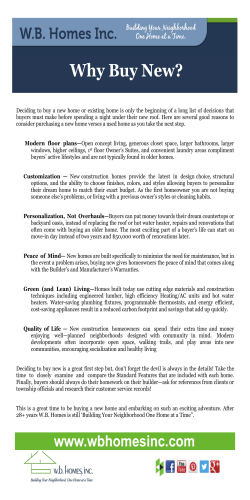
©2011 Cengage Learning
©2011 Cengage Learning California Real Estate Principles Chapter 14 Single-Family Homes and Mobile Homes ©2011 Cengage Learning Chapter 14 1. 2. 3. Identify construction terms associated with home building. Differentiate among architectural styles. Discuss the advantages and disadvantages of owning a: a. b. c. 4. Mobile home Condominium Vacation home List the advantages and disadvantages of owning versus renting. ©2011 Cengage Learning Home Construction Styles One story Simplest to build Easiest to maintain Occupies more land per square foot of living space ©2011 Cengage Learning Split Level Home More expensive to build Better utilization of land Good for varying topography Pleasing cosmetic effect ©2011 Cengage Learning Two Story Home Lower cost per square foot Difficult to reach some of exterior areas One foundation One roof Stairs ©2011 Cengage Learning Roof Styles One sided Flat Shed Two sided Gable * Four sided Hip * Gambrel * Five sided Victorian Mansard * Pyramid ©2011 Cengage Learning Architectural Styles Colonial: New England, Georgian, Southern, Dutch California: Bungalow, Ranch*, Monterey * English: Elizabethan, Tudor French: Provincial Norman ©2011 Cengage Learning Architectural Styles Victorian* Spanish Contemporary Mediterranean or Italian ©2011 Cengage Learning Construction Details Key words: A. Ceiling joist C. Cripples D. Bracing E. Fire stop F. Flashing G. Floor joist L. Rafter O. Stud ©2011 Cengage Learning Remodel: Ceiling joist & studs ©2011 Cengage Learning Remodel: framing & studs ©2011 Cengage Learning Remodel: Header, studs, foundation, & floor sheathing ©2011 Cengage Learning Manufactured Home Sales If made after June 15, 1976, it must have a HUD tag If purchased after July 1, 1980 can be taxed as real estate if attached to a permanent foundation Licensees should read mobile home Residency Law Civil Code 798 and Mobile Home Parks Act Sections 18200 of Health and Safety Code ©2011 Cengage Learning Selling Manufactured Homes NEW manufactured home must be sold by Mobile Home Dealer, licensed by Dept of Housing & Community Development. • USED mobile home can be sold by DRE Real estate licensee if the mobile home has already been registered with Department of Housing and Community Development ©2011 Cengage Learning Manufactured Homes Single: 8 foot x 10 foot wide Single: 10 foot wide unit Multiple-wide, double-wide or triple-wide Quad: four units together ©2011 Cengage Learning Financing Mobile Homes Considered personal property Recorded Security agreement (not trust deed) FHA, DVA and Cal-Vet loans Bank conventional loan Amortized for 15 or 20 year term Higher interest rate than conventional home loans ©2011 Cengage Learning Condominiums Condominium – exclusive interest in living unit and common interest in remainder Condo developments have an owner elected governing board of directors Condos may be residential, commercial or industrial ©2011 Cengage Learning Condominium Owner can sell individual unit Insurance usually with association Income tax benefit of home ownership Lower maintenance costs for amenities Individual loan with equity Ownership appreciation More amenities Homeowner association dues ©2011 Cengage Learning Vacation Homes Risk – Greater risk than principal home Liquidity – Ability to convert home to cash Management – Cost and time at a distance Tax aspects – Deduct loan interest Appreciation – Increased future value ©2011 Cengage Learning Rent or Buy? Amount of cash Down payment or refundable deposit Monthly payment Fixed, variable or known future rent increases Mobility Long term or short term housing need Maintenance Time, money, convenience, tax benefits Appreciation Future cash or rental income Security Stable and more known or unknown ©2011 Cengage Learning Review Quiz Chapter 14 1. A real estate licensee can sell used mobile homes provided the mobile homes have been registered with the: a. Department of Housing and Community Development b. Federal Housing Administration c. Department of Veterans Affairs d. Department of Real Estate ©2011 Cengage Learning Review Quiz Chapter 14 2. Which of the following regarding mobile homes is true? a. interest rates on loans are usually lower than on conventional homes b. they usually depreciate more rapidly than a conventional home c. they cannot be financed using FHA, VA, or Cal-Vet programs d. in most cities, they are allowed to be placed in any residential area ©2011 Cengage Learning Review Quiz Chapter 14 3. One advantage a two-story home has over a one-story home is: a. usually less cost per square foot to build b. ease of access to the roof c. convenient floor plan for disabled people d. easier to maintain ©2011 Cengage Learning Review Quiz Chapter 14 4. What portion of the building do the upright beams, known as studs, rest upon? a. collar beam b. floor joist c. fire stops d. sole plate 5. Which of the following is false regarding condominium ownership? a. There are commercial as well as residential condos. b. Each owner has an undivided interest in common areas. c. Airspace within each unit is held as fee simple ownership. d. All condos are single level buildings. ©2011 Cengage Learning Review Quiz Chapter 14 6. Which of the following roof styles is best described as a "pitched roof sloping from two sides with the sides meeting at the top"? a. gable roof b. gambrel roof c. hip roof d. mansard roof ©2011 Cengage Learning Review Quiz Chapter 14 7. In the construction of a frame house, the short vertical 2" x 4" boards above or below a window opening are commonly called a cripple or a: a. lintel b. sole plate c. header d. cripples 8. In order to protect a building from seepage of water to the inside, around chimneys, and in the valley of the roof, builders use what is known as: a. flashing b. matting c. drain pipe d. curbing ©2011 Cengage Learning Review Quiz Chapter 14 9. All registration fees on the transfer of title to a mobile home must be paid within: a. 5 days b. 10 days c. 15 days d. 30 days 10. Before purchasing a house, a person must decide whether to rent or buy. In considering the pros and cons, which would be considered an advantage of owning rather than renting? a. tax deductions b. possible appreciation c. control d. all of the above ©2011 Cengage Learning Answers to Chapter 14 Review Quiz 1. A 6. A 2. B 7. C 3. A 8. A 4. D 9. B 5. D 10. D ©2011 Cengage Learning
© Copyright 2025





















